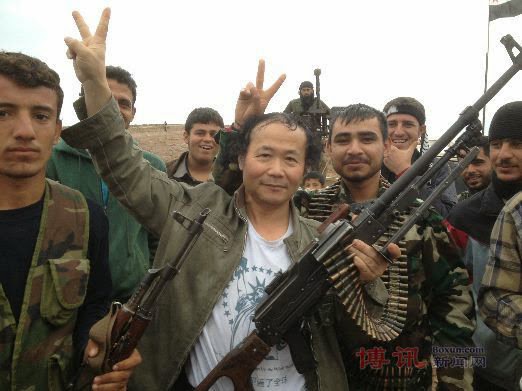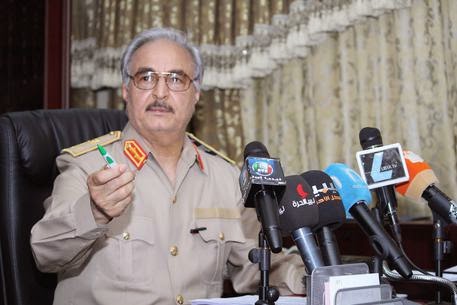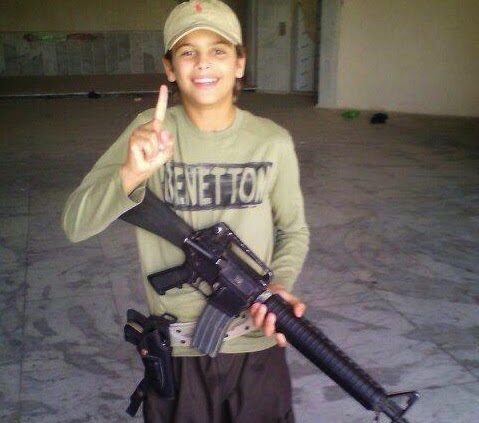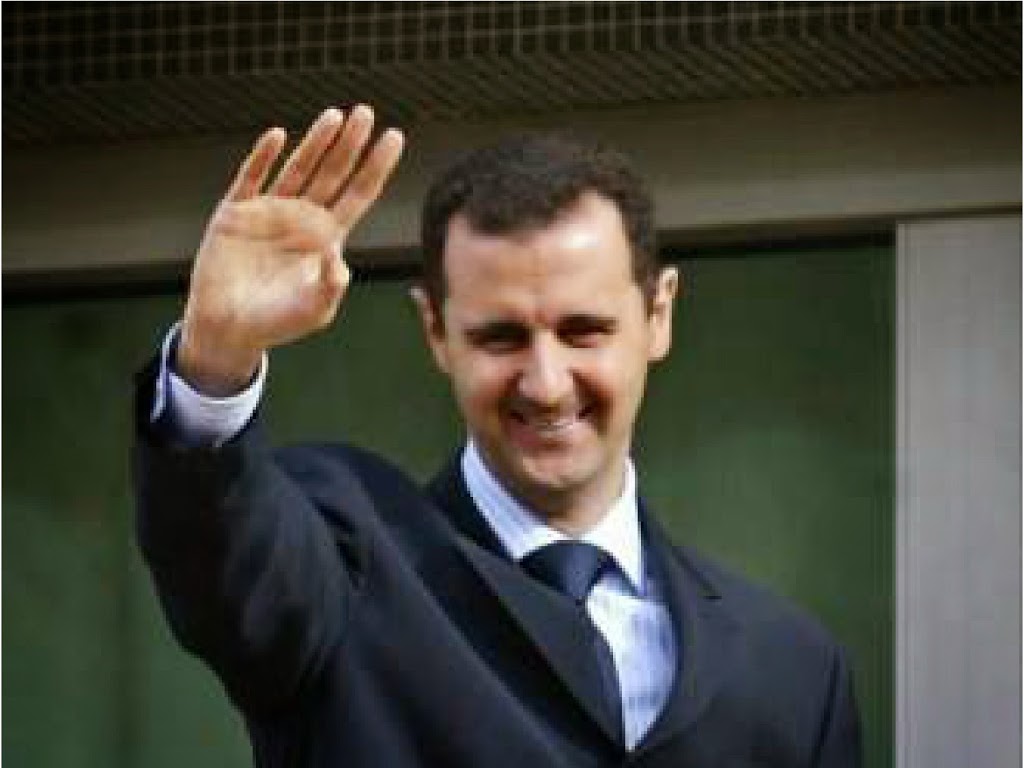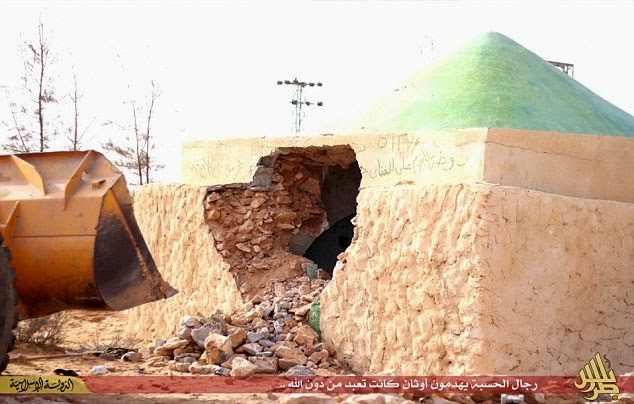Nigeria, Boko Haram’s girl kills 34 in market blast
At least 34 persons were killed by a teenage girl suicide bomber on Tuesday at a crowded market in the northeastern Nigerian city of Maiduguri, said witnesses.
The blast by a female teenager occurred in the market near the Old Elkanemi Cinema in the late afternoon, said Musa Danbaba, a member of a civilian protection militia. He said 34 bodies were counted and many more were wounded.
No group immediately claimed responsibility for the bombing, but it bears the hallmarks of Nigeria’s Islamic extremist group, Boko Haram.
The Maiduguri market is where suicide bombers on Saturday detonated explosives that killed 54 people.
Boko Haram is waging a nearly 6-year insurgency to impose Muslim Shariah law in Nigeria.
An estimated 10,000 people were killed by Boko Haram violence last year, according to the U.S. Council on Foreign Relations. Last week Boko Haram announced its allegiance to the Islamic State extremist group operating in Iraq and Syria.
Help lift arms embargo, Libya army chief asks Renzi
The head of the Libyan armed forces, General Khalifa Haftar, on Tuesday asked Italian Premier Matteo Renzi for help in getting an arms embargo lifted so his troops can stem the advance of Islamic State.
“I ask Renzi to convince the international community to lift the arms embargo and help us fight for a Libya free from extremists…it’s decisive for Italy too: should ISIS win your security would be at risk,” he told.
The general added that if the Tobruk government prevails it could stop extremists sending desperate migrants across the Mediterranean.
Approval for Libya’s request for weapons, jets delayed by UN
At least eight United Nations Security Council members delayed approval on Monday of a request by Libya to import weapons, tanks, jets and helicopters to take on Islamic State militants and monitor its borders, diplomats said.
Spain – supported by Lithuania, Chile, New Zealand, Britain, France, Angola and the United States – placed a so-called “hold” on the request to the Security Council committee that oversees an arms embargo imposed on the North African state in 2011, said council diplomats, speaking on condition of anonymity.
“Spain would appreciate further information on the point of origin of the weapons requested and the arrangements established for transportation,” the Spanish U.N. mission wrote to the chair of the committee in a note seen by Reuters.
Libya wants to import 150 tanks, two dozen fighter jets, seven attack helicopters, tens of thousands of assault rifles and grenade launchers and millions of rounds of ammunition from Ukraine, Serbia and Czech Republic.
If agreement is not reached to lift the hold, it could leave the request in limbo indefinitely. The 15-member committee works on the basis of consensus.
The internationally recognized government is allowed to import arms with approval of the committee. Libya said it needs the weapons and equipment to take on Islamist militants and to control borders.
“Without strengthening the air force we cannot do anything about it,” Libya’s U.N. Ambassador Ibrahim Dabbashi told Reuters, adding that he was disappointed by the delay.
U.N. sanctions monitors say they are concerned that if the committee approves the request, then some of the weapons and equipment could be diverted to militia groups.
“Spain is also deeply concerned about the major threat to international peace and security posed by the proliferation of weapons in the region,” the Spanish U.N. mission said.
Libya’s internationally recognized government has operated out of the east since a rival armed faction called Libya Dawn took over Tripoli in fighting last year and set up its own administration.
The rival governments are battling for control of Libya four years after Muammar Gaddafi was ousted. The chaos has allowed Islamic State and Ansar al-Sharia militants to strengthen their foothold in Libya, an OPEC member.
Libya has called for the arms embargo on the government to be lifted entirely. The council committee has long urged Libya to improve monitoring of its weapons over concerns that arms were being diverted to militant groups.
Source: nation.com.pk
Isis: 13 year old boy is youngest French jihadist killed in Syria
A 13-year-old boy is said to have become the youngest French jihadist to die fighting for the Islamic State (Isis) in Syria.
Abu Bakr al-Faransi was killed while on patrol at an IS border post near the western city of Homs a couple of months ago, as it was attacked by the Syrian army, local sources told France’s RFI radio.
The teenager from Strasburg, eastern France, was taken to the civil war-torn country and enrolled as an Islamist fighter by his family last year, according to RFI journalist David Thomson.
Thomson, a jihadism expert who authored a book titled Les Français jihadistes (The French Jihadists), quoted an IS militant as celebrating the boy’s death as “martyrdom”.
“He was a good child, determined. I loved him very much,” the source said. “This news makes me happy. I’m happy for him.”
Al-Faransi reportedly arrived with his entire family in Syria last August. Travelling with a camper van, his parents took him and six of his siblings to the IS de-facto capital of Raqqa, initially to recover the body of another brother Mohamed, who had died in fighting there, an investigation by Europe 1 revealed.
The family eventually remained in IS-controlled territory, joining the jihadi group. Several photos depicting some of the young brothers posing with Kalashnikov rifles were posted online.
One of them, said to be aged 10, also featured in a propaganda video where he was briefly interviewed along another child from Toulouse. Brandishing an automatic rifle, he urged other French children to join the conflict “We are in Raqqa here, there is war here […] come here and you’ll see how it goes,” the child said in the clip.
According to Thomson at least two of the brothers are among the roughly 90 Frenchmen who are believed to have been killed fighting for IS.
France is largest western contributor of militants to extremist militias in Iraq and Syria, with more than 1,200 of its nationals believed to be fighting there, according to the International Centre for the Study of Radicalisation (ICSR).
IS has been known to groom children to take part in jihad, also setting up dedicated military training camps, with the objective of creating an entire generation for whom violent Islamic extremism is normal practice.
With help from his allies, Syria’s Assad looks set to stay
As the United States and Iran negotiate the final stages of a nuclear deal, they are still oceans apart on another area of conflict: the future of Syrian President Bashar al-Assad.
Assad seems more likely to survive the Syrian crisis than at any point since it began four years ago. Iran’s support is as solid as ever to its confident-looking ally in Damascus.
The days when Assad was largely absent from view and his mere appearance was news have given way to almost daily reports on his activities; recent visitors included four French members of parliament who defied their government’s policy to see him.
The civil war has no doubt left Assad weakened, but he is stronger than the groups fighting to topple him. Powerful states still want to see him gone, but they have shown less resolve than allies who are standing by him.
As the crisis approaches its fourth anniversary, the demand for Assad’s departure is heard less often from his Western foes. Their attention has instead switched to fighting Islamic State, an enemy they share with him.
While the United States and his Arab enemies bomb the jihadists in the north and east, Assad and his allies have launched a major offensive against mainstream rebels and Islamists in an area of greater importance to them, the southern border zone near Israel and Jordan. In Damascus, observers close to the government see this as the start of a phase that will end the conflict on Assad’s terms.
Iranian-backed Lebanese group Hezbollah is backing the southern campaign and Iranian advisers are in the field – mirroring the situation in Iraq, where they are helping to oversee operations against Islamic State, said a senior Middle Eastern official familiar with Syrian and Iranian policy.
“The battle in Syria is still a very long one, but without existential threats for the government,” he said.
The continued support for Assad has defied the hopes of Western governments that it might wane as a slump in oil prices makes it more expensive for Tehran to prop up the devastated Syrian economy, or as Iran negotiates with world powers for a deal over its disputed nuclear programme.
“The Iranians still view Assad as the top man,” said the official, speaking on condition of anonymity because his assessment was based on private conversations. “He is the focal point of their relationship with Syria.”
Russia, too, shows no sign of abandoning a leader who finds himself at the centre of two struggles: between Moscow and the West, and between Sunni Muslim Saudi Arabia and Shi’ite Islamist Iran.
A senior U.S. State Department official said support provided to Assad by backers including Iran had allowed him to avoid a negotiated end to the conflict, and described Iran’s role as “destructive”.
“We continue to coordinate with the international community on ways to limit Iran’s efforts to resupply the Assad regime with the means to perpetuate its brutality against the Syrian people,” the official said.
MEDIA OFFENSIVE
A confident-looking Assad has meanwhile embarked on a public diplomacy campaign, giving five interviews since December. Three were with organisations based in the Western states most opposed to his rule: the United States, France and Britain.
But it seems unlikely to end Assad’s pariah status in the West and among his Arab enemies. U.N. reports detail the army’s use of indiscriminate violence, including barrel bombs. U.S. officials often say he is a leader who has gassed his own people, a charge the government denies.
The war has killed some 200,000 people and displaced close to half the population, according to U.N. figures. Damascus accuses its Western and Gulf Arab opponents of seeking to destroy the country by providing aid to an insurgency now dominated by jihadists who pose a threat to the West.
The state’s territorial grip is much reduced, but it still controls the most populous areas. The rest is divided among jihadists, mainstream rebels and a Kurdish militia that has emerged as an important partner in the U.S.-led battle with IS.
The overstretched military and allied militia have suffered big losses this past year. Even with its air force, the army has been unable to finish off insurgents on important frontlines such as Aleppo.
Insurgents repulsed a recent offensive to encircle rebel-held parts of Aleppo, killing at least 150 soldiers and pro-government militiamen, according to the Syrian Observatory for Human Rights, a British-based group that monitors the conflict.
But neither Aleppo nor Islamic State-held parts of the country matter to Assad as much as the corridor stretching north from Damascus through Homs and Hama and then west to the coast.
Assuming the army and allied militia win, the battle against the insurgents in the southern border zone would eliminate one of the last big threats to Assad.
It would prevent his foreign enemies from funnelling military aid to rebels via Jordan, and enable Assad to preserve a frontier with Israel. That is a big consideration for Damascus, Hezbollah and Iran, which have all sought to build popular legitimacy around the struggle with Israel.
“This is considered a qualitative shift in the war we are waging,” said Damascus-based strategic analyst Selim Harba.
Mohamed Kanaisi, editor of the state-run Baath newspaper, said: “Military progress must lead to a political solution. The other forces will be forced to deal with the Syrian government.”
VICTORY OR COMPROMISE?
The idea of an outright military victory runs counter to the widely held view in the West that the war can only end with a compromise. Diplomacy aimed at promoting such an outcome has gone nowhere since peace talks collapsed a year ago.
Western officials are seeking ways to prop up what is left of the mainstream opposition so it can go to future negotiations on a stronger footing. The United States is planning to train and equip rebels to fight Islamic State.
But the scale and focus of the programme seem unlikely to change the power balance quickly, if at all.
Assad appears to be betting that the U.S.-led campaign against Islamic State will force Washington to engage with him, particularly as Iraqi forces prepare to take back Mosul in northern Iraq. An effective campaign against IS in Iraq can only be waged with cross-border cooperation that would stop the jihadists from regrouping in Syria.
Assad says he is already being kept abreast of the U.S.-led air strikes in Syria via third parties including Iraq.
Western officials dismiss the idea of rehabilitating him as a partner in the fight against IS: even if they staged a U-turn, Assad would be incapable of winning back all of Syria, they say.
The senior U.S. State Department official said: “We maintain our firm belief that Assad has lost all legitimacy and must go. There can never be a stable, inclusive Syria under his leadership.”
Iraq: Islamic State blows up 10th century Assyrian Catholic monastery near Mosul
The Islamic State (Isis) has blown up a 10th century Chaldean Catholic church north of Mosul and bulldozed a nearby graveyard, according to sources.
Nineveh Yakou , Assyrian Archaeologist and Director of Cultural Heritage and Indigenous Affairs at A Demand for Action, exclusively told IBTimes UK that the Mar Gorgis or George (St George or Markourkas) monastery has been “wiped out” by IS militants.
The building, located on the Ba’werah neighbourhood on a hill north of Mosul on the other side of the Tigris river, was founded by the Assyrian Church of the East on the 10th century but rebuilt as a seminary by the Chaldean Catholic Church in 1840.
“The current monastery was built on an archeological site containing ancient Assyrian ruins. It was an important show of continuity from the Assyrian to our culture,” Yakou said.
“Isis is wiping out the cultural heritage of Iraq. The monastery was classified as cultural heritage. It’s a cultural and ethnic cleansing.”
The report was confirmed by Dureid Hikmat Tobia, adviser for minorities of Ninawah province, in a report on Turkish Anadolou news agency.
The attack on the monastery came after IS militants reportedly bulldozed the 2,000-year-old city of Hatra and the Nimrud archaeological site near Mosul.
Two weeks ago, the jihadist group published a video showing militants destroying artefacts in a Mosul museum and at the Nergal Gate to ancient Nineveh, taking a sledgehammer to artefacts.
The attacks on artefacts and antiquities in Iraq and Syria are carried out in the name of an iconoclastic and strict interpretation of Islamic law. IS draws inspiration from early Islamic history, rejects religious shrines and condemns Iraq’s majority Shi’ite Muslims as heretics.
ISIS continues its desecration of the Middle East: Islamic State reduces Sufi shrines in Libya to rubble in latest act of mindless destruction
Prague to sell 15 warplanes to Baghdad
The Czech government on Monday approved the sale of 15 combat and training L-159 jets to help Baghdad fight the jihadist Islamic State group, the defence minister told reporters.
Half of British ISIS terrorists already home: 350 jihadists have returned to Britain, have been labeled as ‘dangerous’
Around half the estimated 700 Britons who have gone to fight with Islamic State jihadists in Syria have returned home, The Sunday Telegraph newspaper reported.
The weekly broadsheet’s figures, in a story about a leaked draft of the Home Office interior ministry’s new counter-extremism strategy, go further than previous estimates, of around 500 individuals leaving and 250 returning.
Around 320 “dangerous” jihadists have come back to Britain, the newspaper said.
The new counter-extremism plan involves targeting Muslim Sharia courts, a ban on radicals working unsupervised with children, and a requirement that job centers identify welfare claimants who may become radicalization targets, the report said.
There would also be welfare penalties to encourage people to learn English, in order to improve integration, and tighter rules on granting citizenship to ensure newcomers embrace “British values”, the broadsheet said.
The Home Office declined to comment on the report when contacted by AFP.
The Sunday Telegraph said it understood that the draft will be published before parliament is dissolved at the end of the month before the May 7 general election.
The foreign national problem
Some 15,000 foreign nationals have joined ISIS, according to a special UN Security Council report in October 2014, although earlier estimates revealed that number could be as high as 75,000.
Although the report itself did not mention the names of the countries from which foreign fighters are coming, it has been widely published that recruits are coming mainly from countries like France, Russia, the United Kingdom and Ireland.
Britain has been a particular breeding ground for radicalization, however, and the Home Office has embarked on a mad dash to control the threat.
In October 2013, MI5 Chief Andrew Parker warned “that there are several thousand Islamist extremists here who see the British public as a legitimate target.” That threat was illustrated earlier last May, when a 25-year-old British soldier was brutally beheaded by Muslims in the middle of a London street.
Indicating the level of the British threat, the CIA sent a special contingent of agents last June to investigate the extent of Islamic extremism in the UK, in a snub to British intelligence agencies.
Then, this November, two brothers became the first Britons to be jailed for terrorism training in Syria, after they had admitted conspiracy to attend a terrorism training camp in 2013.
A month later, a British mother of six who hoped one of her sons would become a jihadist was jailed for five years and three months after she used social media to encourage acts of terror in Syria.
The report also surfaces just as British authorities have confirmed the identity of ISIS executioner “Jihadi John” as 26 year-old London native Mohammed Emwazi.
New measures published shortly after the announcement seek to prevent Britons from leaving the UK to join the group. Under the proposed new laws, Home Secretary Theresa May would be able to prevent airlines from carrying passengers, including children, believed to be traveling to take part in “terrorism-related activity” on known routes, such as those into Syria, according to a Home Office statement.
